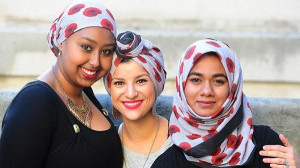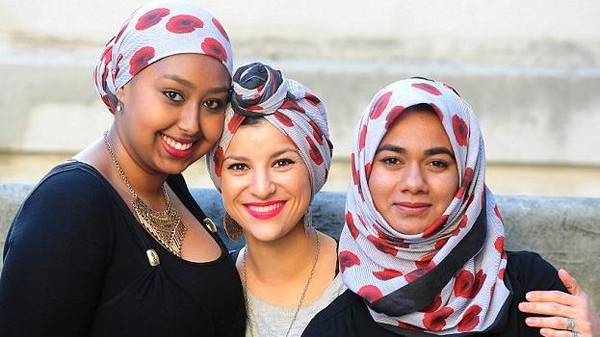
British Muslims are being urged to wear a new ‘poppy hijab’ as a challenge to extremist groups who ‘spout hatred’ towards the Armed Forces. The campaign is being backed by the Islamic Society of Britain (ISB), and profits from its sale will be donated to Poppy Appeal. Sughra Ahmed, President of ISB, said it’s a way for “ordinary Muslim citizens to take some attention away from extremists… This symbol of quiet remembrance is the face of everyday British Islam – not the angry minority who spout hatred and offend everyone.”
The headscarf is patterned with poppies, and has been created specifically for Remembrance Day this year. Tabinda-Kauser Ishaq, 24, a student at the London College of Fashion and a British Muslim, designed the hijab. She says, “the idea to do a headscarf came from knowing that many Muslims generally mark Remembrance Day. We felt it wasn’t that widely known. The number of Muslim soldiers who fought in World War One was even less known. We wanted to create something that illustrated this history.”
More than a million Indian soldiers and 400,000 Muslims fought alongside British troops in 1914, but it is a fact that is little known or talked about. It’s why the Islamic Society of Britain and integration think tank British Future, which is selling the hijab online, approached Tabinda to help them find a symbol of Remembrance that would appeal to. It’s also where the idea of the poppy hijab came from. “I thought it was a really simple and clean way of saying that I’m very proud of being British and Muslim without it being in anyone’s face,” she says.
However, some have attacked this initiative. The Huffington Post scathingly criticises the campaign. It argues that the poppy hijab is a counterproductive and patronising since it singles out Muslims as being a suspect community whose allegiance lies elsewhere. Many British Muslims, they claim, do put their religion before their nationality but that doesn’t make them any less integrated. What that means, is that there is a significant percentage of Muslims who practice Islam holistically as a comprehensive way of life, which includes speaking the truth, standing up for justice, speaking up for the oppressed and accounting their government.






